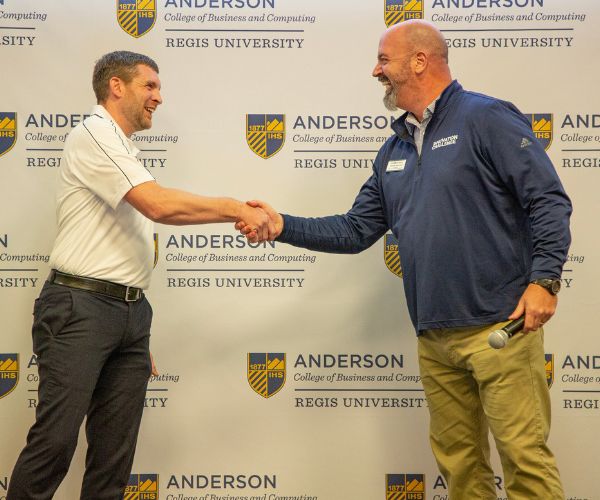Micro-hydroelectric generator created by MBA graduate wins Innovation Challenge
A generator that harnesses the power of the water used by homes and businesses has won the sixth annual Regis Innovation Challenge, and the company will take home the top prize of $10,000 to further a goal of adding an eco-friendly supplement to existing power sources.
Tap Energy, founded by Regis Master of Business Administration alumnus Coty Church, was awarded for its innovative approach to generating power. The device, which Church described as a “mini–Hoover Dam in your home,” is a “micro-hydroelectric generator that captures excess pressure from the main water supply and converts it to usable electricity, presenting an innovative and eco-friendly supplement to existing power sources,” according to materials provided by the company.
Church said the idea started when he took a class taught by Innovation Center Director and Regis Prof. Ken Sagendorf.
“I'd had the idea for a long time before and I used it as a project for one of his classes,” said Church, who graduated from the MBA program on Saturday. “He said, ‘you should really get in the Innovation Challenge.’”
Between his career as head of new product development at Hunter Douglas, family and the MBA program, Church initially wasn’t so sure his busy schedule would allow time for innovating a new business idea. But then, he said, his wife encouraged him to take the risk and enter the challenge. Throughout the process, Church received mentorship that helped take an idea that started in the classroom to the top of the Innovation Challenge.
As Church looks ahead to the next steps of his business, he’s planning to get certifications for his product. Church also said he plans to install a prototype of the generator in his home to begin collecting real-world data. Over the past few months, he has been fielding requests from potential customers who are willing to be test users.
During the Innovation Challenge, Church faced competition from six other innovative businesses:
- DizzyDx, a web-based clinical decision support tool for health care providers who evaluate people experiencing dizziness, created by Regis faculty members Nicole Miranda, Heather Campbell and student Aiden Bromaghin
- Golf Greener, a company that retrieves and resells sunken golf balls, founded by Elliott Gorsuch and Justin Kolb
- NGMT, the first modeling and talent agency tailored to the Indigenous community, founded by Lillian Manygoats and Robert Sebern
- Enviobag, a multipurpose environmentally friendly and biodegradable tote bag that is four times stronger than cotton and starts decomposing in less than two weeks, founded by Vanessa Trevizo, Samara Renteria Lopez, Briana Renteria Lopez, Malia Ahmad, and Alexa Lucero
- Gravity Coaching, an online workforce partner that offers education, coaching and community support for nurses to help prevent burnout, founded by Danella Pochman, Aly Lovell and Bryan Sykes
- Traveling Ground, a company that buys and sells mid-to highend used bikes and components, founded by Anton Cariffe and Mason Whitcomb
Traveling Ground, founded by recent Regis graduates Cariffe and Whitcomb in their dorm room, took home second place and $5,000 to further develop the company. Gravity Coaching and DizzyDx took home third place prizes of $2,500 each.
This year, the challenge also welcomed a group of seniors from Arrupe Jesuit High School, who participated in and won Regis’ inaugural Arrupe pitch event in March. The seniors presented Enviobag, a tote intended to combat the environmental hazards of traditional grocery bags. The seniors were awarded $1,000, a prize awarded each year to a company that was just an idea the day the Innovation Challenge started in the fall.
During introductory remarks, Sagendorf said the challenge provides an opportunity for students to participate in entrepreneurial activities. The program is open to the public, as long as a Regis student is part of the team. Unlike other challenges in the state, the competition is student-run. Student leaders Juan Gonzales and Maya Bair organized this year’s competition.
“Something really unique about our Innovation Challenge is our focus on starting, running and growing small businesses,” Sagendorf said.
